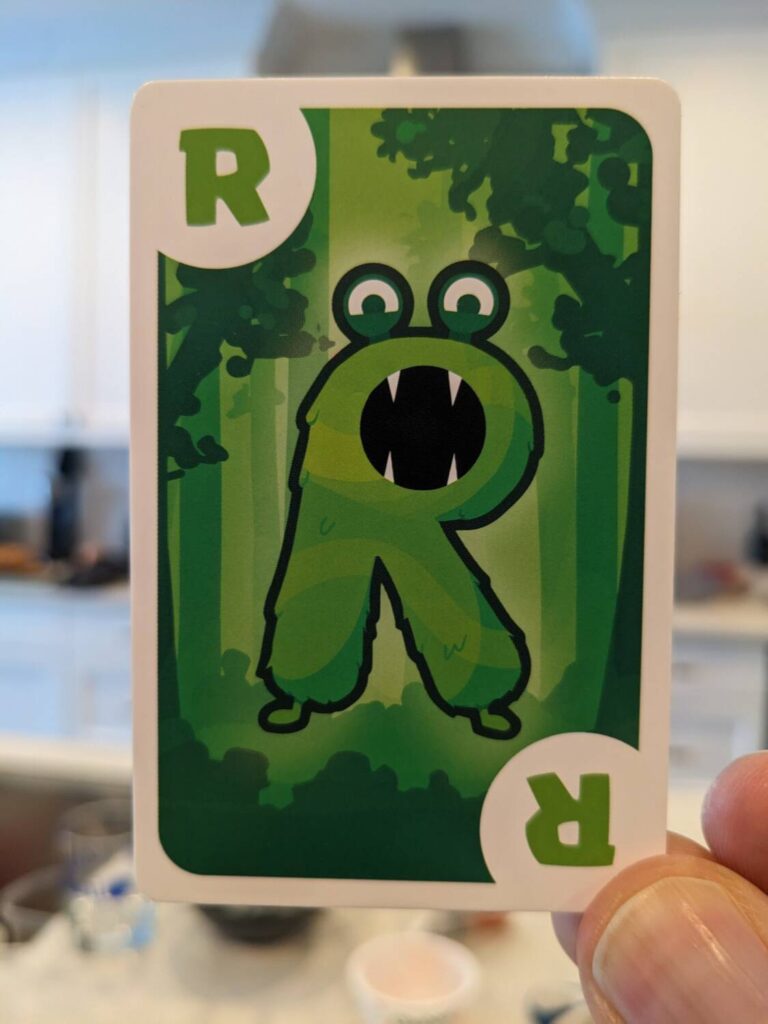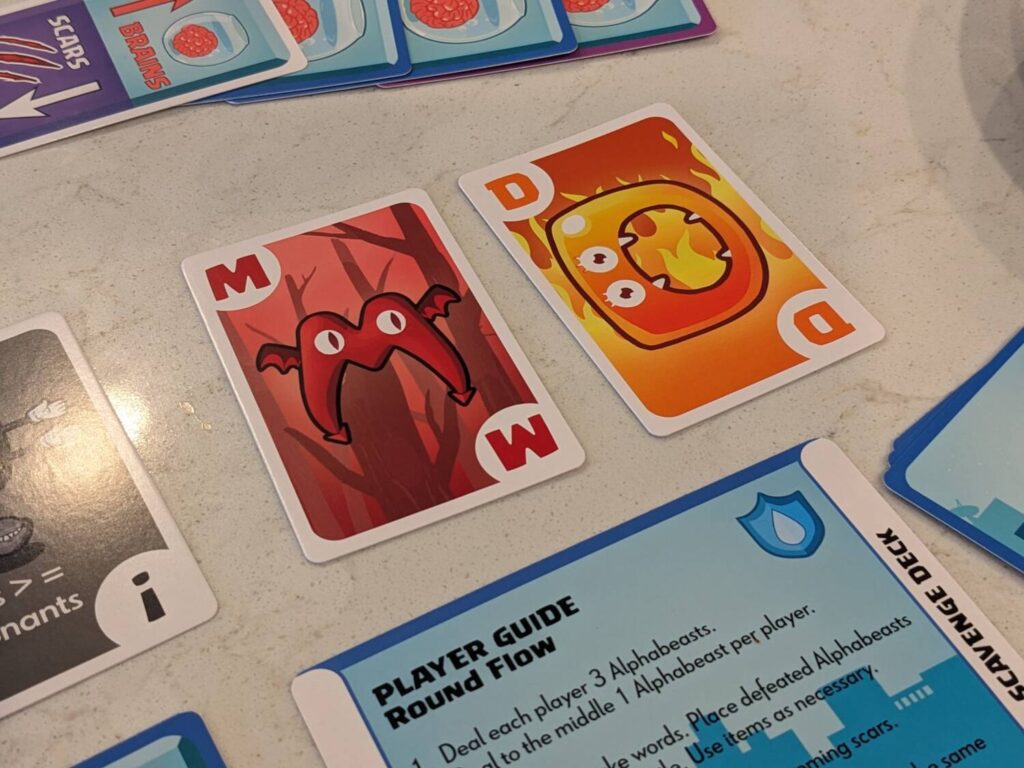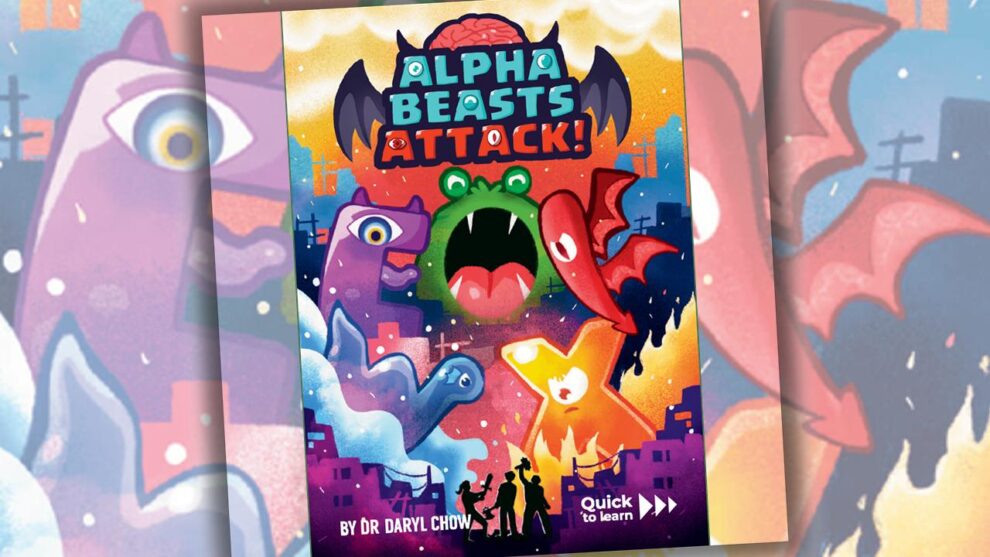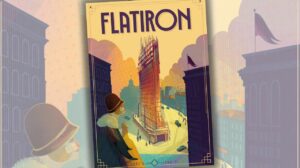Disclosure: Meeple Mountain received a free copy of this product in exchange for an honest, unbiased review. This review is not intended to be an endorsement.
“Is this cooperative?”
My eight-year-old likes to play board games, but he loves to play cooperative board games. Games like Dead Cells: The Rogue-Lite Board Game are amongst his very favorite experiences, in part because he likes to high-five teammates in-between successful turns. So while he will play—and often win—competitive games, his barriers to entry drop to zero the second he hears that we received a new review copy that allows for everyone to fight for the cause together.
My family also loves word construction and word association games like Scrabble, Just One, and Caution Signs. I recently whipped out Alphabeasts Attack!, designed by one of our favorite designers, Daryl Chow (Reef Rescue, Shop Until You Drop). Here was my pitch:
“Cooperative Scrabble with cards, plays in about 15 minutes. Aliens.”
The heads of children popped up over the glow of their respective tablet screens. “I’ll play,” the eight-year-old declared. “Sure, that’s short,” my 11-year-old chimed in, desperate to spend just enough time with their parents to ensure they can continue living at the house rent-free.
Even my wife—the one who usually uses family board game time to slowly clear her work inbox while I entertain children with board games—offered to join, since the game was so short.
One round in, I had them. Alphabeasts Attack! has a cute theme and a nice brain burn in a team-friendly package that should work for anyone who likes to flex their vocabulary.

H-A-R-V-E-S-T
A bit like one of my favorite word games of the past few years, Illiterati (2023, Gap Closer Games), players must work together in Alphabeasts Attack! to defeat the villainous entity of the game’s title to take down baddies by using words, not swords, rayguns or missile defense systems. 2-5 players are each dealt three cards from a large deck of cute single letters and in-round conditions every turn, each representing a single Alphabeast. Then, a pool of cards accessible to any player is added to the center of the table, cards that are a mix of single consonants, vowels, and conditions for a particular word. Conditions include things like “no repeat letters” or “[the word must have] vowels ≥ consonants”, for example.
Then players work independently to come up with a word that ideally uses at least the three letters/conditions in front of their player area. If they can, players can try to use some/all the letters/conditions in the central pool, but they can’t share that information in advance.
Here’s the only hard part of Alphabeasts Attack!, at least for a Scrabble player or anyone used to the literal definition of word construction. In this game, players use the three letters in front of them to form a longer word, in most cases.
For example, let’s say you were dealt an I, an E, and a D. You could certainly blurt out D-I-E. You could, instead, do something like A-B-I-D-E, E-D-I-C-T or any other word that uses at least the three letters you were dealt. If you had those same starting letters, you could have a word like R-I-D-E and also defeat a condition card like “vowels ≥ consonants”, if that was in the middle of the table.

For the adults, the hardest thing I found across my three plays was this additional step. The letters dealt to players are a starting point to form a longer creation, so creativity is required to build up larger words and align with the condition cards.
Once everyone has come up with a word, scoring is easy. If any letters were not used across the players and the central card pool, each is flipped over and counted as a “scar”…with the back side of all the cards in the deck featuring a handsome dinosaur-like slash across the bottom to use as the negative scoring reminder. Defeated cards are placed beneath each owner’s player mat (which doubles nicely as the game’s player aid…because remember, every single game needs a player aid).
Cards come in seven colors (six colors, plus the gray shading used for word condition cards). When a player has five different colors of the cards in their player area, or four of a single color, they can discard a batch to reveal one of the six cards in their Scavenge deck, which was randomly shuffled during setup. The Scavenge deck has a mix of helper cards (such as items that allow a player to help a teammate come up with a word) and brains—Brains are positive points that help drive towards the win condition. (In the rulebook, players are told that they must harvest the brains of dead Alphabeasts in order to save Earth. Nice.)
When players have either brains or scars equal to two times the number of players, they either win or lose the game immediately.

Y-E-S
Alphabeasts Attack! won the approval of my family (which is absolutely the audience that will see this game the most moving forward) during the first round of our first play.
It’s quick. It’s a fun teaching tool. It scales perfectly to player count. It has already created memories in my household. In my first two-player game with my eight-year-old, on the very first turn, he was dealt an X, a U, and a condition card: “no repeat letters.” I had three easier letters, and while I was working on my first word, he already had his answer.
“Luxor,” he said. I had forgotten that I had shown him the game Luxor a few months ago, and he had not forgotten the name.
In a later game of Alphabeasts Attack! I used the word “commonwealth” to deal with all my letters, a “one consecutive letter pair” condition card, and all the letters in the middle of the table. The kids have had a blast trying to come up with bigger and bigger words to try and knock out a bunch of letters/conditions at once. And the game comes with four difficulty levels, adding or removing copies of certain letters and conditions to align with various communities.
Alphabeasts Attack! has earned a place in the permanent collection. Pick this one up if you are looking for family-friendly word association fun!











Add Comment